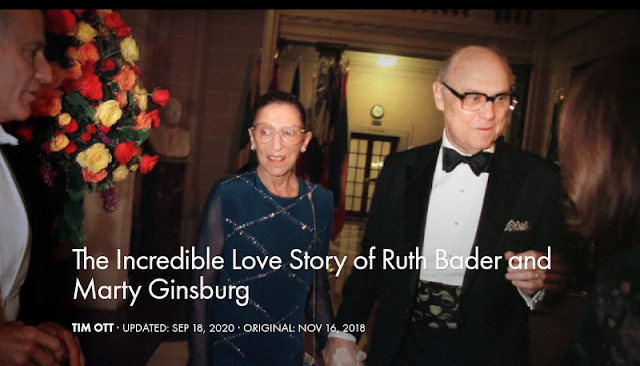The Incredible Love Story of Ruth Bader and Marty Ginsburg
The Incredible Love Story of Ruth Bader and Marty Ginsburg
They say that behind every great man is a great woman and behind every great woman is a great man. But only a few lucky souls know what it's like to walk step-by-step with a life partner, each helping the other through unforeseen obstacles to achieve emotional fulfillment and professional success of the highest order together.
Such was the case with Supreme Court Justice Ruth Bader Ginsburg and her longtime husband, Marty.
Ruth and Marty met on a blind date
Their story began after Ruth arrived at the Cornell University campus in 1950. They formally met on a blind date, though it was only "blind" on one end – Marty, already a sophomore, had urged a friend to set him up with the cute new freshman. Before long he realized that this petite beauty was a cerebral powerhouse, an observation that wasn't lost on his soon-to-be inseparable companion.
As Ruth later recalled, "He was the first boy I ever knew who cared that I had a brain."
Friends marveled at how these two seemingly contrasting spirits matched up: Ruth came across as shy and timid, Marty was the clown, the life of the party; she was prompt, meticulous and thorough; he cut class to play golf. But for all the surface differences, there was also the undeniable bond of their joint Brooklyn-area origins, adherence to the Jewish faith and intellectual capacity to examine and impact the world around them.
Ruth stood by Marty's side when he was diagnosed with cancer
The two married in June 1954, after Ruth graduated from Cornell and Marty finished his first year at Harvard Law School and detoured to Fort Sill, Oklahoma, for Marty's stint in the military. There they had the first of their two children, daughter Jane, and began adjusting to their strengths and weaknesses as a couple. For example, for all of Ruth's talents, she was a lousy cook. Frightened by the thought of a lifetime of reheated tuna casseroles, Marty took the reins in that department and developed a reputation as a culinary wunderkind.
Ruth eventually followed her husband to Harvard Law, where life threw a major obstacle in front of them. During his final year, Marty was diagnosed with a rare form of cancer, requiring grueling radiation treatments. Ruth organized his class notes and typed his final paper, all the while dealing with her own coursework and taking care of a three-year-old. Somehow it all came together, with Marty graduating on time, magna cum laude.
In hindsight, it's clear how the experience with Marty's illness went a long way toward forging Ruth's place in history. Along with installing in her a confidence that she could shoulder a superhuman burden, the enduring prospect of a relapse meant that she had to be prepared to provide for the family. That pushed her to hunt down a job when few law firms were willing to hire a woman, leading to her professorship at Rutgers University and her groundbreaking work in shattering gender discrimination laws on behalf of the ACLU.
Marty campaigned for Ruth's Supreme Court nomination
Meanwhile, her husband was making his own mark as a top tax lawyer and professor, and by the time Jimmy Carter nominated Ruth to the D.C. Federal Court of Appeals in 1980, it was Marty's turn to do the heavy lifting. He helped secure her confirmation by enlisting the aid of influential clients, including Ross Perot, and readily left behind his life in New York, telling friends his wife "got a good job" in D.C.
In early 1993, when Supreme Court Justice Byron White revealed to Bill Clinton that he was retiring, Marty was at it again. His task to get Ruth on the nation's highest court was a tall one. Not only was she buried on the President's list of preferred candidates, but she also wasn't even a favorite of women's groups because of recent critical comments about Roe v. Wade. But Marty managed to weed out her opponents and countered by soliciting letters of support from an army of scholars.
Clinton, who famously took his time in stewing over the decision, finally agreed to meet with Ruth in June. Within 15 minutes of their get-together, he knew he had his pick.
In an introductory speech for his wife at Georgetown University Law Center in 2003, Marty giddily shared how their daughter, Jane, told reporters that she had grown up in a home in which responsibility was equally divided: dad did the cooking and mom did the thinking. This was coming from a distinguished academic and arguably the top tax lawyer in the country, but that was Marty: happy to give Ruth credit for being the smart one while claiming dibs on the kitchen.
Ruth and Marty were married for 56 years
Seven years later, after seeing his wife through a bout of pancreatic cancer, Marty's own troubles with the dreaded disease resurfaced. He passed away on June 27, 2010, a few days after their 56th wedding anniversary.
Ruth carried on solo, but by no means alone. In a late-career twist, she has become the closest thing the Supreme Court has to a rock star, fêted with the "Notorious RBG" nickname while having her workout featured on The Late Show with Stephen Colbert and becoming the subject of memes, books and movies.
And she was supposed to be the quiet one? One can only imagine Marty, beaming with pride, laughing at the irony of it all.
Reference :
Biography .com



Comments
Post a Comment